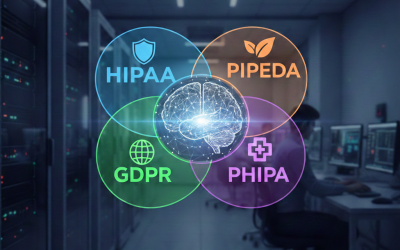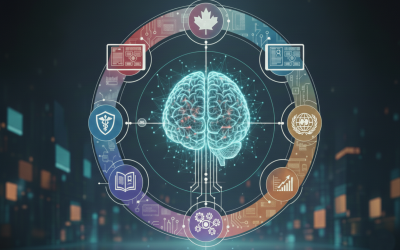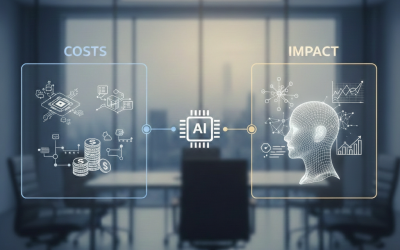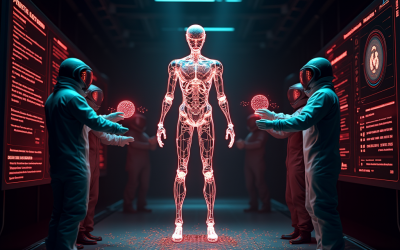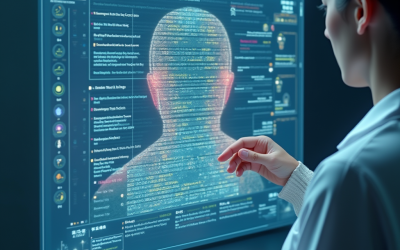Improved Diagnostic Accuracy and Efficiency
AI has demonstrated a substantial impact in improving the accuracy, speed, and reproducibility of medical diagnostics across multiple domains. Studies from the National Institutes of Health (NIH) and the World Health Organization (WHO) indicate that AI-assisted imaging can match or exceed clinician-level performance in areas such as radiology, dermatology, and ophthalmology.
- According to WHO (2024), AI algorithms in radiology achieved 95% accuracy in detecting tuberculosis from X-rays in low-resource settings – comparable to expert radiologists.
- NIH meta-analyses show AI systems improve cancer detection rates by 5-15% in breast and lung imaging tasks, while reducing false negatives.
- AI diagnostic support tools can cut interpretation times by 30-50%, allowing clinicians to focus more on patient care and treatment planning.
AI’s diagnostic potential is most impactful when used to augment – not replace – clinicians. Decision-support systems trained on diverse data improve diagnostic consistency and support precision medicine efforts.
Streamlined Clinical Workflows and Operational Efficiency
The integration of AI in hospital management and clinical workflows has produced measurable efficiency gains. From automating administrative processes to optimizing patient triage and resource allocation, AI contributes to faster service delivery and cost reductions.
- The OECD Health Working Paper (2023) found that AI-enabled administrative automation reduced time spent on record-keeping by 20-30% in pilot hospitals across Europe.
- Health Canada reports that predictive AI models used in emergency departments improved bed utilization and patient flow, reducing wait times by up to 25%.
- Natural language processing (NLP) systems for electronic health records (EHRs) have cut documentation time for clinicians by approximately 40%.
By taking over repetitive or data-intensive tasks, AI frees up clinicians’ time, improving both productivity and job satisfaction while decreasing the risk of burnout.
Enhanced Patient Outcomes and Early Detection
AI has shown promise in improving patient outcomes through earlier diagnosis, personalized treatment, and continuous monitoring. Its ability to analyze large-scale datasets enables risk prediction and proactive intervention.
- According to WHO’s 2024 review, AI-based screening for diabetic retinopathy in community clinics improved early detection rates by 50%.
- AI-driven monitoring systems, such as wearable devices analyzed through machine learning, have reduced hospital readmissions for chronic disease patients by 10-15%.
- Precision medicine approaches supported by AI-guided analytics are enabling more accurate drug selection and dosage adjustment, improving treatment efficacy and patient adherence.
These outcomes reflect the tangible value AI adds not only to diagnostics but also to holistic, data-driven care management.
Economic and System-Level Impacts
AI adoption in healthcare yields significant economic and systemic benefits by reducing inefficiencies, minimizing diagnostic errors, and improving patient management.
- OECD and World Bank analyses estimate that AI integration could save healthcare systems between 5-10% of total expenditures through operational efficiencies.
- In Canada, Health Canada projects potential annual savings of over CAD $6 billion by 2030 through AI-based optimization of diagnostics, logistics, and patient management systems.
- NIH data suggest that reducing diagnostic error rates by even 5% through AI assistance could prevent over 60,000 adverse events annually in U.S. hospitals.
AI’s economic contribution extends beyond cost savings – it also stimulates innovation, drives new research opportunities, and supports the digital transformation of healthcare infrastructure.
Ethical, Equity, and Workforce Challenges
Despite its benefits, AI’s rapid expansion raises ethical and social concerns that require careful oversight. Issues such as data bias, privacy, and workforce adaptation remain central to sustainable AI integration.
- WHO emphasizes that algorithmic bias can amplify health inequities, particularly when training data underrepresents vulnerable populations.
- OECD (2024) notes that over 60% of AI systems used in healthcare lack transparency regarding data provenance and decision logic.
- Automation and workflow optimization may displace certain administrative roles, necessitating re-skilling and ethical workforce planning.
Adopting robust governance mechanisms – including explainability, accountability, and inclusive dataset design – is essential to ensure AI benefits are distributed equitably.
Future Directions and Responsible Adoption
The next decade of AI in healthcare will focus on responsible scaling and interoperability. International organizations advocate for evidence-based, ethically grounded implementation aligned with global health equity goals.
- WHO’s 2023 global strategy calls for trustworthy AI ecosystems that enhance human oversight and patient rights.
- OECD and European Commission initiatives emphasize standardized AI evaluation frameworks to validate clinical safety and reliability.
- Health Canada’s Digital Health Review (2024) highlights the need for regulatory modernization and harmonization with international AI standards.
Ultimately, AI’s promise in healthcare lies in augmenting human expertise – improving access, quality, and outcomes when deployed with transparency and accountability.
References
- WHO – Ethics and Governance of Artificial Intelligence for Health (2021).
https://www.who.int/publications/i/item/9789240029200 - OECD – “AI in Health: Huge Potential, Huge Risks” (2024 policy brief).
https://www.oecd.org/en/publications/2024/01/ai-in-health-huge-potential-huge-risks_ff823a24.html - “Ethics and governance of trustworthy medical artificial intelligence” (BMC Medical Informatics & Decision Making, 2023).
https://bmcmedinformdecismak.biomedcentral.com/articles/10.1186/s12911-023-02103-9 - OECD – “Artificial Intelligence and the health workforce”.
https://www.oecd.org/en/publications/artificial-intelligence-and-the-health-workforce_9a31d8af-en.html - OECD – “Trustworthy Artificial Intelligence in Health” (2020 report / guideline).
(PDF) https://www.oecd.org/content/dam/oecd/en/publications/reports/2020/07/trustworthy-artificial-intelligence-in-health_756c205c/f5e2bd44-en.pdf - “AI maturity in health care: An overview of 10 OECD countries”.
https://pubmed.ncbi.nlm.nih.gov/38157771/ - PMCID – “Research ethics and artificial intelligence for global health”.
https://pmc.ncbi.nlm.nih.gov/articles/PMC11025232/

